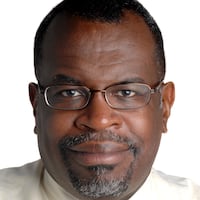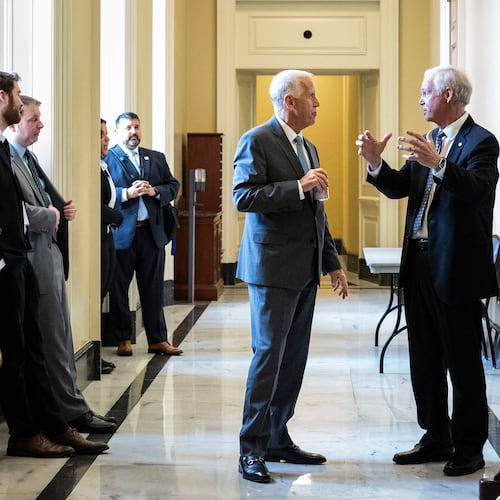The hammer blows struck from within against American democracy’s bedrock are most always verbal and not physical. That doesn’t minimize their power for harm.
The most recent example of too many in this regard is President Donald Trump’s harmful Twitter attacks on four duly elected Congressional representatives. Make no mistake in seeing the president’s intent – it is to make a personal assault grounded in untruths and intended to disparage Constitutionally protected citizens’ rights. And, in a normal time, it would be hard to see as anything other than dangerous race-baiting at a perilous moment when race relations are already badly frayed.
The highest office in the land, if not the free world, should see far better than these divisive antics. Such low blows should be unacceptable to Americans of any political bent. And we should demand that those in leadership roles from any party behave in a manner that buttresses – and not cheaply batters – the Constitution they’ve sworn to uphold.
It is altogether fair and appropriate – even necessary, we’d argue – for Americans and their elected leaders to vigorously debate – and even attack – the ideas and policies of political foes. Much as courtroom arguments over evidence are intended to achieve a true and just verdict, sharp-edged political discussions over government’s programs and worldviews are designed to pressure-test ideas along the road toward making decisions and achieving results.
Doing so honors the America our founders envisioned. Cravenly and slyly Tweeting that four women in Congress should go back where they came from does not. Rather, it dishonors American ideals. And hearkens to a racist past we’ve worked hard to put behind us. What else can be said of schoolyard-bully taunts that willfully ignore that the four representatives, all women of color, are citizens – three of them born on U.S. soil. In law, custom and practice, they are as American as President Trump.
We’ll acknowledge here that this newspaper’s Editorial page, in recent years, has stayed largely clear of Washington’s antics. We’ve chosen to focus our efforts and opinions closer to home. In that vein, this editorial is not about illegal immigration or any other specific policy issue, even though it and other important matters are overdue for bipartisan Congressional action.
That said, as metro Atlantans and Americans ourselves, we are part of a unique legacy and history here that has, in the past, helped usher America toward a better place. We believe that experience can still offer important insights to an angry, divided nation.
Atlanta, and Georgia, have more than once triumphed over similarly rancorous, earlier times. After the Confederacy’s misguided attempt of 150 years ago to maintain slavery under the guise of states’ rights, Atlanta set about rebuilding our city as soon as the guns of the Civil War fell silent after the South’s surrender. This newspaper’s Henry Grady was a leading spokesman of that effort.
A century later, Atlantans showed the world a just path through the struggles of the Civil Rights Movement. We gave birth to Rev. Martin Luther King Jr., who engineered a peaceful route toward change, even amidst bloody attacks against those pushing for the freedom, dignity and equality of full participation for all in the evolving experiment that is America. Atlantans of all colors and creeds backed these efforts, publicly and sometimes privately.
America moved closer to that more-perfect ideal as a result. And this city and state climbed more rungs toward becoming world-class.
That experience gives us a unique perspective, we believe, toward assessing the divisive, harmful, belligerent and even corrosive language that too many of our leaders have adopted of late. Many of us lived through the “America, Love It or Leave It” era of a half century ago. To the best of our knowledge, no one actually left – certainly not citizens — and the upheaval that traditionalists opposed then largely resulted, over time, in a better nation for all of us. This despite jingoism intended to demean, dehumanize and disenfranchise its targets.
Achieving the next level of American progress can’t happen if the citizenry is consumed with anger and thoughts of vengeance, as seems the case now. Conservatives, liberals and those anywhere between are too often too quick to clutch seething feelings of aggrievement. As a result of seeing this nation and world through enmity-narrowed eyes, what we still hold in common is effectively concealed from our own hearts and minds. That is a dangerous place to linger for a country and its citizens.
In a high-level sense, it seems now that anger may be our largest commonality. It knows no political boundary. Both Left and Right are affected. And that should tell us something.
There’s truth in the saying that a house divided cannot stand. It can be seen in the thankfully sporadic recent attacks on the Republic’s foundations from more than one side. Violent protests by anti-fascist marauders. Murders by white supremacists. Insert your own recollection here too.
America today must somehow return our eyes to what should be the common endeavor of a joint destiny – striving always to become a better nation with liberty and justice for all.
And we should recognize that all really means all, not just those of like mind or political party. We should be a lot less quick to routinely, and harmfully, label others "them" or "they" if we disagree on civic matters.
We must demand nothing less of our elected leaders. We did just that not so long ago.
In 2012, the son of famed U.S. House Speaker Tip O’Neill wrote in The New York Times about his dad’s complicated, yet productive, relationship with President Ronald Reagan: “What both men deplored more than each other’s political philosophy was stalemate, and a country that was so polarized by ideology and party politics that it could not move forward. There were tough words and important disagreements … yet a stronger commitment to getting things done.”
We believe that striving once more toward that high ideal can prove fruitful for America.
It should convince our Congress to begin acting on real concerns and challenges, instead of devolving routinely toward politically fueled verbal rock-throwing that makes actual results a casualty of theatrics.
It should reacquaint us all with the respect for humanity upon which the Statue of Liberty stands.
It might motivate all of us to begin acting more like each other’s keeper – and not as the blood enemy of those merely holding different ideas or beliefs.
If we as a nation and people can manage to do that, we might once more prove worthy of that city-nation on the hill which our founders and millions of Americans since have fought for, and bequeathed to us.
About the Author
Keep Reading
The Latest
Featured




